In a groundbreaking development for the casino industry, a leading technology firm has just launched the first-ever blockchain-powered slot machines. This innovative approach promises to enhance transparency and fairness, reshaping how players and regulators view the trustworthiness of slot machine gameplay.
Blockchain technology, primarily known for its role in cryptocurrencies, is now making its mark in the casino world. By integrating this technology, every transaction on a slot machine, including each spin’s outcome, can be recorded on a decentralized and immutable ledger. This significant advancement was announced early this week at a major tech conference in Las Vegas, capturing the interest of casino operators and players alike.
The new blockchain-enabled slot machines are designed to address longstanding issues related to trust and transparency in gaming. Players have often expressed concerns over the fairness of slots, questioning whether the odds are genuinely as advertised or if the machines are manipulated. The use of blockchain effectively lays these concerns to rest by offering a transparent record of every game played, which cannot be altered or deleted.
This technology innovation also simplifies the regulatory oversight process. With blockchain, regulators can instantly verify the integrity of a machine’s operations, ensuring compliance with gambling laws and regulations without invasive audits. This feature not only reduces regulatory burdens but also enhances compliance, benefiting both operators and the governing bodies.
At the launch event, the spokesperson for the technology firm explained, “The integration of blockchain into slot machines represents a pivotal shift in our industry. It provides a dual benefit: enhancing player trust by proving game fairness, while also streamlining regulatory processes.”
The adoption of blockchain slot machines is expected to spread rapidly, given their potential to boost the casino sector’s credibility. Early adopters are likely to be online casinos, which are already tech-savvy and can implement new technologies with relative ease. However, traditional brick-and-mortar casinos are not far behind, with several prominent names expressing interest in adopting this new system.
Player reactions have been overwhelmingly positive. Many appreciate the added layer of security and transparency, expressing that it makes gaming more appealing. “Knowing that each spin is recorded and indisputable makes me feel more secure about where I put my money,” said one enthusiastic player at the conference demo.
The economic implications of blockchain-integrated slots are also significant. Transparent operations are likely to attract more players, thereby increasing play rates and, ultimately, revenues for casinos. Moreover, reduced regulatory hurdles could lead to significant cost savings for casino operators, providing a further economic incentive to switch to this new technology.
However, challenges remain in the widespread adoption of blockchain slot machines. Technical integration and the initial investment in upgrading existing machines represent significant hurdles, particularly for smaller casino operators. Additionally, educating players and regulators about how blockchain works and its benefits are crucial for its acceptance.
Despite these challenges, the future looks promising for blockchain in the gambling industry. As this technology continues to evolve, it could potentially extend beyond slot machines to other forms of gaming, further revolutionizing the sector.
The launch of blockchain slot machines marks an exciting chapter in the evolution of casino gaming. It not only enhances player trust and regulatory oversight but also points toward a more innovative, transparent, and financially robust gambling industry. As we move forward, it will be intriguing to see how widespread this technology becomes and how significantly it impacts the global casino market.

David Farbacu is a seasoned writer with a passion for games, gaming, casinos, and Xbox. With a wealth of experience in the industry, David brings insightful reviews, comprehensive guides, and engaging articles that cater to both casual gamers and hardcore enthusiasts. His expertise spans across various gaming platforms and genres, making him a go-to source for the latest trends and developments in the gaming world.

